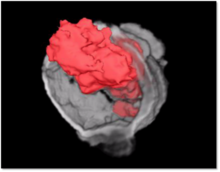Using nanoparticles to deliver drugs directly to tumors is a novel technology developed by NanoMedTrix, LLC, a UI spin-off founded by Jose Assouline, an adjunct associate professor in the Roy J. Carver Department of Biomedical Engineering and the Roy J. and Lucille A. Carver College of Medicine. The targeted delivery of these nanoparticles to treat diseases such as bladder cancer has led to a two-year, $2 million Phase II Small Business Innovation Research (SBIR) grant from the National Cancer Institute.

“Not only do these nanoparticles bind to tumors for treatment, but they also provide imaging of the tumors which we can then analyze,” said Assouline. “These valuable images computed remotely, which has appreciable clinical usefulness during the pandemic when we are working to limit close-contact interactions.”
Researchers are using rapid contrast ultrasounds as part of the remote analysis and are also using MRI data and computational imaging to assess the impact of the nanoparticles.
In traditional drug delivery, the process can be both slow and inefficient through time-consuming absorption and with most of the drug eliminated from the body through natural processes. By using these nanoparticles, drugs can be delivered directly into the tumor faster and remain in the body longer.
The SBIR grant is designed to move the technology beyond the theoretical phase and into commercialization. SBIR grants support research that can be developed into products available to the public and industry.
“Part of what make this technology unique is its combination of pharmacology, image processing, remote monitoring, and its role in non-invasive or minimally invasive procedures,” said Assouline. “We are positioned to treat both tumor and pain as well as monitor long term and chronic diseases through simpler and more effective technologies.”

NanoMedTrix has received funding from the National Science Foundation and the National Institutes of Health and has collaborated with other key industries and universities such as Iowa State University. Assouline also collaborates on this work with Sean Sweeney who received his PhD in biomedical engineering from the UI in 2015. Applications of this platform technology have multiple niches in human health and animal welfare.
For more information on NanoMedTrix, visit the website.
